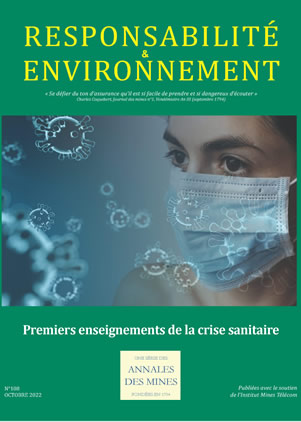|
 N° 108 - Octobre 2022 - Premiers enseignements de la crise sanitaire N° 108 - Octobre 2022 - Premiers enseignements de la crise sanitaire
Covid-19 et nouveaux mécanismes de régulation économique
Par Olivia CHEVALIER
Docteur en philosophie et enseigne notamment à l’IMT-BS, à l’École des Ponts et à Sciences Po Saint-Germain-en-Laye
Nous aborderons dans cet article divers aspects de la crise sanitaire sous l’angle économique. D’abord, dans un contexte d’incertitude radicale non réductible à des risques probabilisables, cette crise spécifique a donné lieu à un fort investissement public dans tous les domaines, faisant apparaître une nouvelle fonction régalienne, selon les mots du prix Nobel d’économie Edmund Phelps, celle d’« assureur systémique ».
Puisque la crise sanitaire a mobilisé les données de santé, nous nous concentrerons sur la numérisation du secteur de la santé français, dont les failles, pointées de longue date par les professionnels, syndicats et associations, ont été à nouveau mises en lumière par la pandémie (notamment, le retard relatif du secteur en matière d’’intégration massive de l’IA).
Il en résulte des difficultés relatives à ce qui est, de facto, une extension du pouvoir étatique dans le domaine économique, donc dans la société civile, et aux modes de financement de l’État-assureur, dont un des effets les plus patents et inquiétants est le piège inflationniste.
 Télécharger gratuitement l'article Télécharger gratuitement l'article
 Retour au sommaire Retour au sommaire
 N° 108 - October 2022 - First lessons from the health crisis N° 108 - October 2022 - First lessons from the health crisis
Covid-19 and new economic regulation mechanisms
Olivia Chevalier,
Doctor of Philosophy and teaches at the ITM-BS, the École des Ponts and Sciences Po Saint-Germain-en-Laye
In this article, we will discuss various aspects of the health crisis from an economic perspective. First, in a context of radical uncertainty that cannot be reduced to probabilistic risks, this specific crisis has given rise to strong public investment in all areas, giving rise to a new regalian function, in the words of Nobel Prize winner Edmund Phelps, of ‟systemic insurer”.
Since the health crisis has mobilized health data, we will focus on the digitization of the French health sector, whose flaws, long pointed out by professionals, unions and associations, have been highlighted once again by the pandemic (in particular, the sector’s relative delay in the massive integration of AI).
The result is difficulties relating to what is, de facto, an extension of state power into the economic domain, and therefore into civil society, and to the methods of financing the State-insurer, one of the most obvious and worrying effects of which is the inflationary trap.
 Retour au sommaire Retour au sommaire
|




